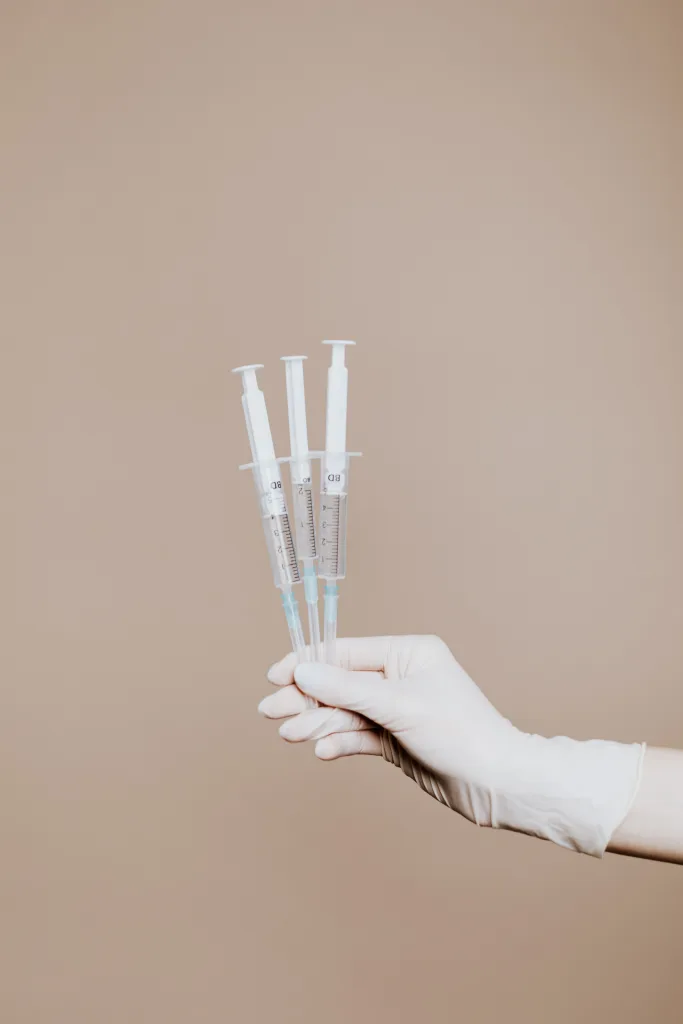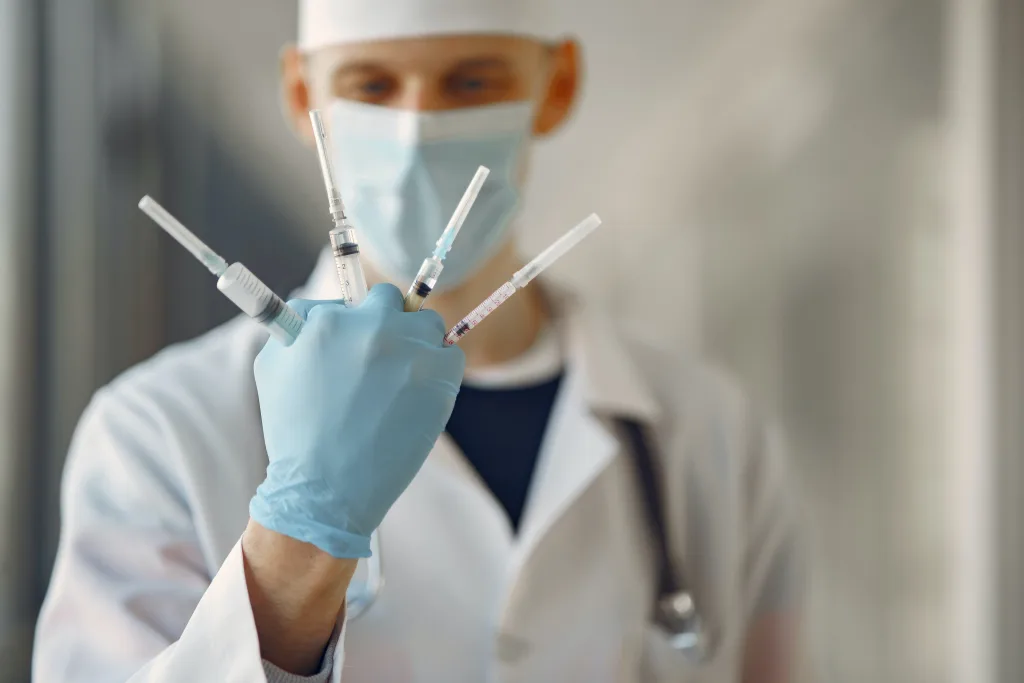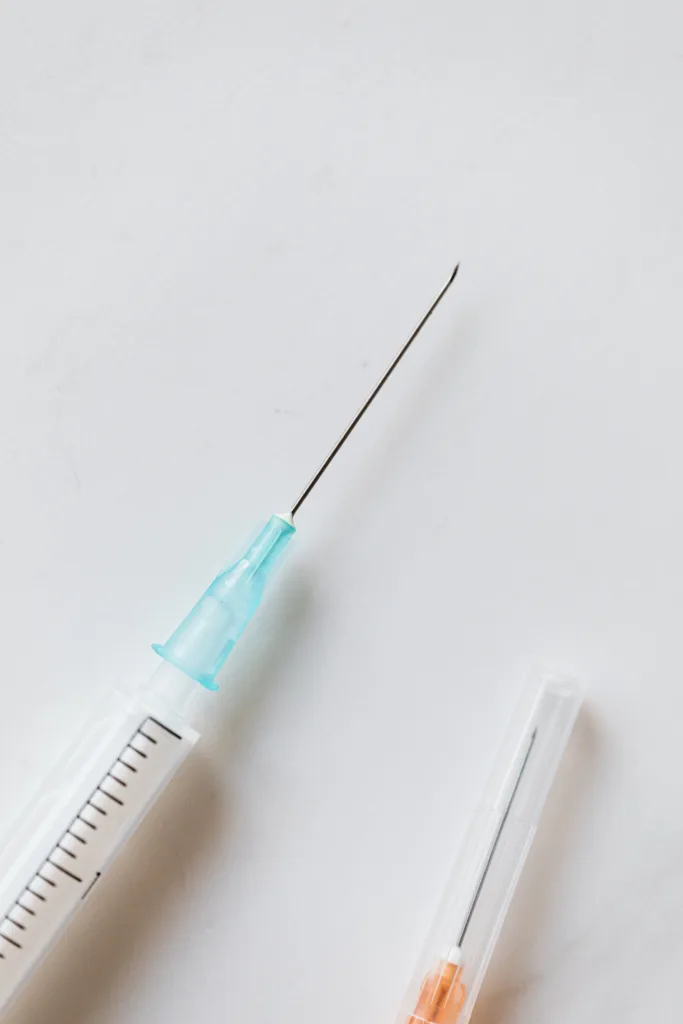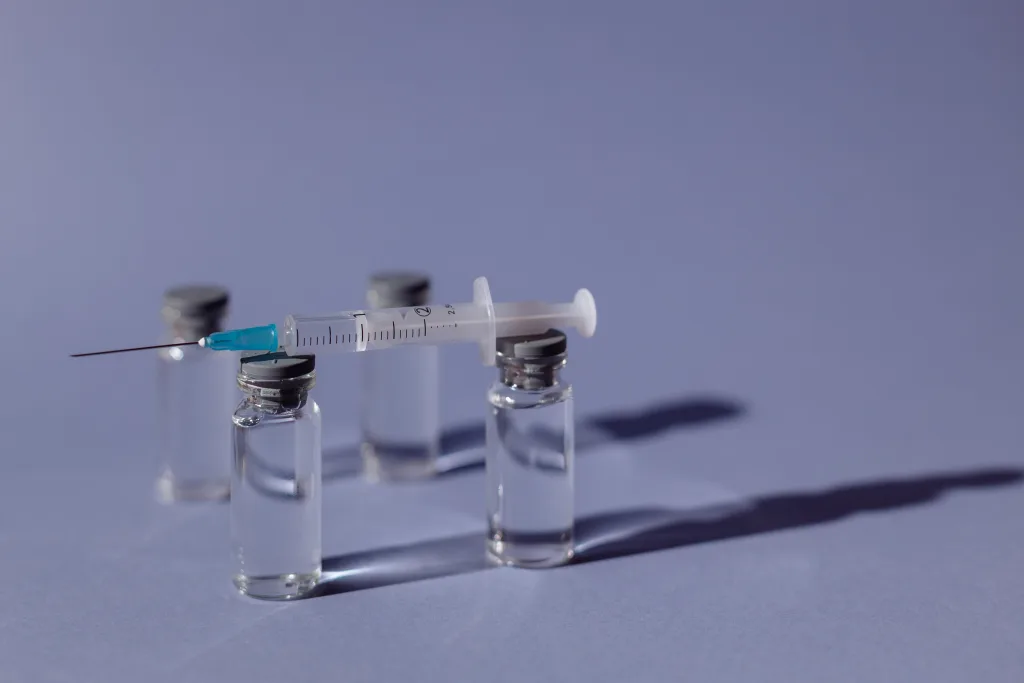Hey there health-conscious friend! If you’ve landed here, my guess is you’re interested in learning more about HCG injections and potential side effects. Way to go researching thoroughly before jumping in. Knowledge is power!
Let me walk you through a deep dive on all-things HCG so you can make the most informed, empowered decision possible. When it comes to injecting hormones into your body, it’s so key to separate fact from fiction and myth from reality.
Together, we’ll explore how HCG works, its uses, potential side effects, safety considerations, and most importantly, how to have productive conversations with your healthcare team. Grab your notebook and let’s get to it!

Back to Basics: What Exactly is HCG and Why Does Our Body Make It?
HCG stands for human chorionic gonadotropin – try saying that five times fast! It’s definitely a mouthful but basically it’s a hormone made by the placenta during early pregnancy. Levels peak in the first trimester, then gradually drop lower toward the end of pregnancy.
HCG has a crucial role in the growth and development of the fetus. It’s one of the first hormones the placenta starts cranking out in mass quantities soon after the fertilized egg implants into the uterus.
This ramps up right around the time the placenta forms and attaches to the uterine wall to establish blood flow and nourishment to the embryo. Pretty amazing how our bodies intrinsically know how to create and sustain an entirely new human life!
Since HCG enters the bloodstream and urine very soon after conception occurs, before other pregnancy signs appear, it forms the basis of most pregnancy tests. The presence of HCG is how at-home tests give such early confirmation of pregnancy – as soon as about 6-12 days post-conception. Aren’t our bodies incredible?
How is HCG Used Medically?
Now that we understand why HCG naturally appears in early pregnancy, let’s discuss how it came to be synthesized and used medicinally. Doctors may prescribe pharmaceutical HCG injections to treat specific fertility and hormonal conditions in both women and men.
For women struggling with ovulation issues or irregular cycles, HCG can help trigger or induce ovulation at the ideal time. This gives mature eggs the optimal chance to fully develop and then successfully release from the ovaries. By boosting well-timed ovulation, HCG improves the odds of conception.
HCG injections may also commonly be used to prepare a woman’s ovaries for assisted reproductive procedures like in vitro fertilization (IVF). Since IVF involves surgically retrieving mature eggs from the ovaries for fertilization outside the body, doctors want ample eggs available to increase chances of success.
By stimulating the ovaries leading up to egg retrieval, HCG helps facilitate maturation and release of not just one but hopefully multiple eggs that can be collected. After retrieval, HCG is also routinely administered to prep the uterine lining for implantation in case of a successful pregnancy.
For men experiencing hypogonadism or chronically low testosterone levels, which can negatively impact sperm production and fertility, HCG therapy aims to restore normal testosterone levels and thereby improve fertility.
When combined strategically with other reproductive medications or treatments, properly administered HCG may aid some men with testicular dysfunction or suboptimal sperm counts in achieving pregnancy with their partner. Restoring hormonal balance can sometimes improve odds.

Okay, Let’s Address the Elephant in the Room – Using HCG for Weight Loss
Now that we’ve covered the legitimate medical uses of HCG, let’s address the ever-controversial topic of using HCG injections for weight loss. You’ve likely seen ads or heard buzz about people turning to HCG diet injections to slim down quickly.
The basis of most HCG diet protocols is taking daily injections of HCG while following an extremely low calorie diet, usually capped at around just 500 calories per day. The claim is that HCG helps suppress hunger and cravings so you can more comfortably sustain calorie restriction without being miserably hungry.
In theory, this allows faster weight loss by mobilizing abnormal fat stores for energy while preserving lean muscle mass despite inadequate caloric intake. However, the FDA has not approved HCG for weight loss purposes, considering available research data insufficient to substantiate fat loss claims or justify the risks.
Most reputable medical organizations and experts agree that current evidence does not definitively show HCG provides substantial weight loss effects beyond what an ultra-low calorie diet alone would achieve. Just want to give you the real deal based on the science! This is still considered an off-label, unapproved use of HCG.
If You Do Opt to Pursue HCG Injections, Medical Supervision is a Must!
After learning about the applications and controversy around HCG, you might be wondering if it’s right for you. Here’s my most important advice should you decide to try it: DO NOT take matters into your own hands and purchase HCG online or attempt to self-inject without medical oversight!
It may be tempting to follow a random blog or order a HCG kit, but acquiring and self-administering prescription HCG without professional guidance can be extremely dangerous and is not medically recommended.
I strongly encourage you to instead work closely with a licensed, reputable medical practitioner to ensure proper administration, dosing, and monitoring if using HCG. A knowledgeable doctor can help maximize potential benefits while mitigating side effect risks through strategic oversight.
Trust me, when it comes to introducing potent hormones into your body, you want an expert endocrinologist or fertility specialist guiding you every step of the way. It’s just not worth the gamble to go rogue! Make your health the number one priority.

Common Side Effects: What Reactions Should You Watch Out For?
Now that you’ve got the background, let’s get into the nitty gritty of potential side effects. Since HCG is a strong hormonal agent, directly injecting it can definitely throw your body’s natural equilibrium out of whack!
Reactions vary widely between individuals depending on factors like dose, frequency, and personal sensitivity, but here are some possible side effects to be aware of:
- Headaches – Ranging from nagging tension headaches to severe migraines. Keep a symptom journal and report any worrisome patterns to your doctor.
- Fatigue – Due to significant hormonal fluctuations, fatigue ranging from mild tiredness to deep exhaustion is very common. Rest and take it easy when your body asks for it. Light exercise may help boost energy between injections.
- Mood changes – Hormone shifts inevitably affect emotions so mood swings, irritability, anxiety, sadness, or feeling down may occur. Have an open dialogue with your physician if mood changes become severe or long-lasting. Certain supplements or counseling may help.
- Breast tenderness – Hormone increases often lead to breast tenderness or swelling. Usually resolves within 1-2 weeks after stopping HCG. Wearing comfortable bras and limiting stimulation can provide symptom relief until it passes.
- Nausea and vomiting – Queasiness or vomiting are not fun but not uncommon. Request anti-nausea medication from your doctor if truly unable to keep food or liquids down. Staying hydrated is crucial.
- Bloating and fluid retention – Due to shifts in the body’s fluid balance, temporary swelling or bloating around the abdomen is possible. Lifestyle tweaks like light exercise, increased healthy fluids, potassium foods, and elimination diets can help ease this.
The key point is that we all react differently to external hormones and medications based on individual factors. Tracking any symptoms in a journal and reporting them promptly helps your doctor best customize your HCG regimen for your unique physiology. Vital signs of an optimal patient-provider team!

Let’s Get Serious – Rare but Potentially Risky Side Effects to Watch For
While most side effects of properly supervised HCG therapy are temporary and mild, there are some rarer but serious reactions to be aware of as potentially life-threatening risks:
- Blood clots – Clots blocking blood flow in the veins of the legs or lungs (DVT or PE) require emergency care. Seek immediate help if experiencing sudden shortness of breath, chest pain, wheezing, coughing up blood, or leg pain and swelling.
- Ovarian hyperstimulation syndrome (OHSS) – Excessively high or prolonged HCG doses can dangerously overstimulate the ovaries. Call your doctor promptly for severe abdominal bloating or swelling, rapid weight gain, nausea, vomiting, diarrhea, reduced urination, or breathing difficulties.
- Hormonal imbalances – Since HCG directly stimulates the ovaries and testes, significant alterations in estrogen, progesterone, testosterone and other hormones may occur. Changes like ovarian cysts, breast tenderness, menstrual irregularities must be evaluated promptly.
- Blood sugar fluctuations – HCG may affect insulin secretion and blood glucose regulation, so those with diabetes require very close monitoring for symptoms like excessive thirst, blurred vision, slow wound healing or unexplained fatigue. Check glucose often.
While risks of serious complications are low when HCG is medically supervised and administered properly, it’s vital to know warning signs and seek prompt medical care. Don’t delay in reporting anything that seems awry. You know your body best!
Key Factors that Can Sway the Risk vs Benefit Analysis
Given the range of possible side effects, a logical question is whether potential benefits ultimately outweigh the risks when considering HCG therapy. As with most aspects of medicine, the risk-benefit calculus depends heavily on your unique health status and circumstances. Let’s explore key variables:
- If you have pre-existing conditions like clotting disorders, stroke history, diabetes or related issues, the risk side of the equation tips heavily. After thoughtful consultation, you may wisely conclude that benefits simply don’t justify the sizable risks given your medical profile.
- Dosage and injection frequency also clearly play a role. More intensive regimens with higher daily doses or shots scheduled too closely together appear to heighten side effects dramatically. The ultimate goal is determining the minimal effective dosage and ideal injection spacing to reduce side effect likelihood.
- How the HCG is administered can impact how your body absorbs and responds to it. Injection techniques include subcutaneous (into the fat layer under skin), intramuscular (into muscle), or sublingual (under the tongue). Discuss the pros and cons of each.
- Long-term or prolonged use of HCG injections seems to drive up cumulative risk substantially compared to shorter term or cyclic use with built-in breaks. Therapeutic courses with purposeful off-periods may promote safety.
- For those considering HCG injections for essential fertility treatments, the potential benefits of finally being able to conceive may be judged to outweigh the smaller risks after thorough examination and counseling with your physician. This is a very personal determination.
The bottom line is to discuss your complete health history candidly with your doctor and voice any questions or concerns you may have. Together, taking all facets of your situation into account, you can make the most informed decision as to whether HCG injections are the right choice or if alternatives may be safer or more effective given your circumstances.
Parting Words: Knowledge is Power on the Path to Optimal Health!
There you have it my friend – the real deal when it comes to potential HCG injection benefits, side effects, precautions, and key points for making this personal decision. I hope you feel genuinely empowered by comprehensive information to have thoughtful, rewarding dialogues with your healthcare team.
Remember true health arises from caring not just for your physical body but your emotional, mental and spiritual wellbeing too. Consider complementary nutrition, movement, stress-relief and self-care practices for sustainable balance and energy. You’ve got this!
Wishing you the very best no matter where your journey leads. Stay open, be confident, trust your intuition, and make your self-care a priority. You deserve to feel your absolute best from the inside out.
Thank you for reading this post, don't forget to subscribe to our free newsletter
!